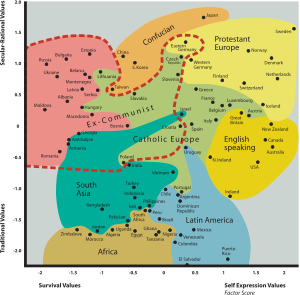
The society of the United States is based on Western culture, and has been developing since long before the United States became a country with its own unique social and cultural characteristics such as dialect, music, arts, social habits, cuisine, and folklore. Today, the United States is a racially and ethnically diverse country as a result of large-scale immigration from many countries throughout its history.[1]
Its chief early influences came from English and Irish settlers of colonial America. British culture, due to colonial ties with Britain that spread the English language, legal system, and other cultural inheritances, had a formative influence. Other important influences came from other parts of Europe .
The United States has often been thought of as a melting pot, but recent developments tend towards cultural diversity, pluralism, and the image of a salad bowl rather than a melting pot.[2][3] Due to the extent of American culture there are many integrated but unique social subcultures within the United States. The cultural affiliations an individual in the United States may have commonly depend on social class, political orientation, and a multitude of demographic characteristics such as religious background, occupation, and ethnic group membership.[4] The strongest influences on American culture came from northern European cultures, most prominently from Britain, Ireland, and Germany.
- ^ Thompson, William; Joseph Hickey (2005). Society in Focus. Boston, MA: Pearson. ISBN 0-205-41365-X.
- ^ Clack, George; et al. (September 1997). "Chapter 1". One from Many, Portrait of the USA. United States Information Agency. Archived from the original on 2006-11-22.
- ^ Adams, J.Q.; Pearlie Strother-Adams (2001). Dealing with Diversity. Chicago, Illinois: Kendall/Hunt Publishing Company. ISBN 0-7872-8145-X.
- ^ Thompson, William; Joseph Hickey (2005). Society in Focus. Boston, MA: Pearson. ISBN 0-205-41365-X.